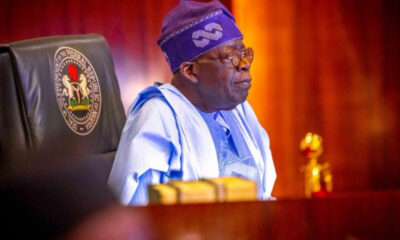The Nation
It’s a shame Nigeria still generates only 4.5GW of electricity says Tinubu

Considering the nation’s substantial size and potential, President Bola Tinubu has expressed his dissatisfaction with the current electricity generation capacity of 4.5 gigawatts in Nigeria.
President Tinubu underscored the pressing necessity for innovative strategies to resolve the nation’s economic challenges during the inauguration of a 31-member Presidential Economic Coordination Council at the Presidential Villa in Abuja. He emphasised the crucial role of public-private partnerships in the facilitation of these essential reforms.
“We face a serious challenge with energy security in Nigeria. There is a pressing need to enhance our oil and gas sector and significantly boost electricity generation and distribution nationwide,” stated President Tinubu.
“It is a disgrace that, as a nation, we are still producing only 4.5GW of electricity. We are committed to increasing oil production to 2 million barrels per day in the coming months and will remove barriers to investments in the energy sector to boost competitiveness.”
The President announced a series of measures under the Economic Stabilization Programme, which align with the National Construction and Household Support Programme, aimed at stabilizing the economy, creating jobs, and ensuring economic security. These measures include an energy security initiative designed to increase on-grid electricity from 4.5GW to 6GW within six months, raise oil production to 2 million barrels per day within a year, and eliminate investment obstacles in the sector.
Furthermore, President Tinubu outlined initiatives to improve agriculture and food security. The plan aims to increase the production of staple crops by small-holder farmers from 127 million metric tons in 2023 to 135 million metric tons this year. The program will also support large-scale commercial farmers and use satellite imagery for better land use planning and crop management.
In the health and social welfare sector, the government aims to make essential medicines more affordable for 80-90 million Nigerians and expand healthcare insurance coverage for 1 million vulnerable individuals through a Vulnerable Group Fund, in collaboration with state governments. Additionally, 20,000 healthcare workers will be redeployed to underserved areas, and renewable energy sources will power 4,800 primary healthcare centers and hospitals.
President Tinubu also revealed fiscal measures to enhance access to finance for the housing sector, MSMEs, and the manufacturing sector. These measures include a facility providing lower-cost short-term loans to youth-owned businesses, a Manufacturing Stabilization Fund to support up to 250 companies with affordable long-term financing, and a Grow Nigeria Development Fund to foster rural MSMEs and housing projects.
“These fiscal measures are expected to generate 4.7 million direct and indirect jobs over the next six to twelve months, significantly bolstering our economy,” concluded President Tinubu.































